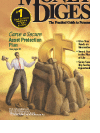Publication
Article
Physician's Money Digest
Give Your Funds an International Flair
Author(s):
Most physician-investorswith some experience instock market investmentsrealize the critical role thatproper diversification plays inachieving long-term stock marketinvesting success.When you investin stocks without utilizing properdiversification fundamentals, you'regambling rather than investing.Without adequate diversification,you're betting a significant amountof your investment on the fortunesand successes of the few particularcompanies in which you haveinvested your money.
PLACING YOUR BET
If you guess right and thosecompanies do very well, you standto do much better than the marketas a whole. But if those companiesdon't do so well, you will performsubstantially worse than the market.Knowing how badly the market didover the past 3 years, how wouldyou like to have performed substantiallyworse?
Look at some of the employeesof Enron, who were substantiallyunderdiversified with significantamounts of their 401(k) portfoliotied to the fortunes of that 1 company.When you don't adequatelydiversify, you can potentially hit orlose big. This is not the kind ofstrategy that should serve as thefoundation of a long-term wealthbuildingplan.
MUTUAL FUND DOWNSIDES
Broad diversification with relativelysmall dollar amounts is themost compelling benefit of mutualfunds as investment vehicles. Thereare negatives to mutual fund investing,however, such as unavoidableongoing costs that reduce yourreturn, sales and other hidden costs,loss of control over some elementsof the tax consequences of yourinvestments, and having your investmentperformance in partdetermined by the investment decisionsof your other "partner"investors in the fund.
These all make mutual fundsmuch less appealing than a tailoredportfolio of individual securities forinvestors with portfolios of an adequatesize. But for an investor withinadequate resources to develop awell-diversified portfolio of individualsecurities, properly selectedmutual funds are the best investmentoption to reduce risks from stockinvesting that would otherwise arisefrom inadequate diversification.
MULTICULTURAL MARKETS
Today, the US stock market representsonly 30% to 40% of the valueof all stocks in the world. Even if youare well diversified in the US market,in the end, you're not very diversifiedif you're missing investments in theother 60% to 70% of the stocks thatare available around the world.
Statistics show that with 30% to40% of your portfolio invested ininternational stocks, compared toinvesting solely in the US market,you actually increase your expectedaverage annual return over time andyou decrease the annual volatility ofreturns (ie, your returns' swingbetween extreme highs and lows).This is because international markets,while tied somewhat to the USmarket in the global marketplace,still have factors influencing themthat create movement independentof the US market. This is whatmakes international stocks valuablein a diversification effort.
INTERNATIONAL DIVERSITY
If you want to achieve properinternational diversification, the followingare a few things to consider:
1. You will need to use mutualfunds to achieve proper internationalexposure.You should be broadlydiversified in a number of stocks ina number of countries. This canonly be achieved on an individualsecurity basis, with very large dollaramounts. Use mutual funds as analternative. If you like index investing,there are international indexinvestments available.
2. Global funds are usually notinternational funds. While globalfunds have some elements of internationalinvestments, they usuallyalso invest in US stocks. If you use aglobal fund, you're leaving the decisionas to how much of your portfoliois actually invested internationallyto the manager of that fund. Ifyou want to control the percentageof your overall portfolio in internationalinvestments, use a fund thatinvests almost exclusively in non-US investments.
3. If possible, try to find and usefunds that don't use currency hedging.When you invest in an internationalstock, you're investing in thefortunes of the particular companyin its country. But that company'sperformance is going to be measuredin terms of its local currency.
CURRENCY FLUCTUATIONS
An additional element ofrisk/return for a US investor arisesfrom the fact that the value of theUS dollar fluctuates with the valueof the local currency. If the dollar isstrengthening against the foreignstock's currency, it will reduce theUS investor's return on the stockinvestment. If the dollar is weakeningagainst that currency, the USinvestor's return will increase.
Some funds attempt to take currencyrisk out of the return throughvarious currency hedging strategies.But these strategies come at a costand actually can harm return if themanager makes a currency bet thatturns out to be wrong. In the longrun, currency risk is essentially zero.So your best bet is to try to find afund that does not hedge currency,and just let the currency movementsbe what they are.
Diversification is important. Anda properly diversified equity portfoliowill include a proper allocationto international stock investments—perhaps as much as 30% to 40%. Ifyou decide to do this, try to useinternational mutual funds thathave little US market exposure anddo not hedge against currency risk.And if you need assistance in implementingyour international investmentstrategy as part of your overallinvestment plan, be sure to consultwith a knowledgeable, objective,independent advisor.
Thomas W. Batterman is theimmediate past president of theAssociation of IndependentTrust Companies, a nationalorganization of more than 100chartered, well-capitalized, andinsured members who manage their clients'financial assets during life and after death. Formore information, visit www.aitco.net.
